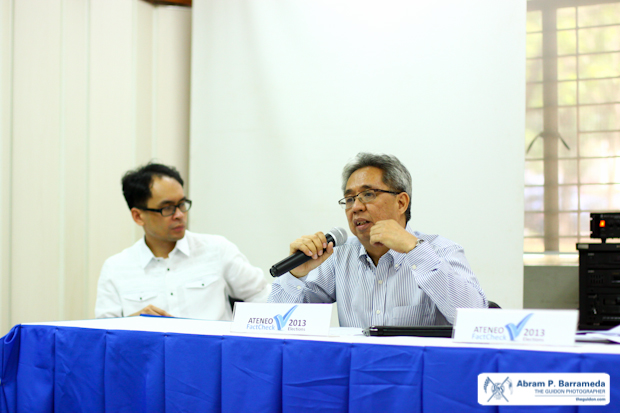
EMPLOYING ECONOMICS. Former Economics Department Chair Fernando Aldaba, PhD discusses the importance of job generation. Photo by Abram P. Barrameda
THIRTEEN SENATORIAL candidates belong to political clans, a press release by the Ateneo School of Government’s (AsoG) fact-checking initiative, FactCheck 2013, revealed at a forum on Monday, April 29.
The panel listed the following as members of political clans: Sonny Angara, Bam Aquino, Nancy Binay, Alan Peter Cayetano, Tingting Cojuangco, JV Ejercito, Jack Enrile, Francis “Chiz” Escudero, Richard Gordon, Ernesto Maceda, Jun Magsaysay, Cynthia Villar and Juan Miguel Zubiri.
According to ASoG Political Democracy and Reforms (Poder) Program Director Joy G. Aceron, a senatoriable belongs to a political dynasty if he or she has relatives who have held positions in the national or local levels for several terms.
Aceron is a panel member for FactCheck 2013, a three-part series of press releases aimed to check the consistency of senatoriables’ claims and positions on national issues with their track records.
Other members of the fact-checking group include Vice President for Social Development Atty. Jaime Hofileña and former Economics Department Chair Fernando Aldaba, PhD.
It was formed through ASOG’s Poder Program.
Their latest press release focused on political dynasties and unemployment.
Previously, the panel tackled coalitional politics and the Freedom of Information (FOI) bill.
Their last brief, to be released on May 6, will take on the topics of conditional cash transfer, gender and women empowerment and the “Team Buhay, Team Patay” issue.
On political dynasties
Of the listed candidates, Angara, Binay, Cayetano, Cojuangco, Escudero and Gordon oppose the Anti-Political Dynasty bill.
The brief explained that the said senatoriables give more importance to the quality of public service a politician can give rather than his or her membership in a political clan.
Furthermore, the panel discovered that the opposing candidates believe voters are free to choose whom they deem fit for office.
The brief also revealed that for Angara, Binay, Cayetano, Cojuangco, Escudero and Gordon, political dynasties are not an issue and are not illegal.
Meanwhile, Aquino, Enrile, Maceda, Magsaysay and Zubiri endorse the bill.
Chief reasons for their support include the imperativeness to define a political dynasty, the lack of policy to hinder the inclusivity of democratic process and the accumulation of power and wealth under one and the same family.
Employment rate in PH
The brief also touched on the issue of unemployment in the country.
The panel confirmed a claim that only a few among the top 20 senatoriables have comprehensive platforms that address lack of jobs and unemployment.
Despite the country’s “spectacular growth,” Aldaba said that the Philippines has high instances of underemployment and unemployment.
The latest Labor Force Survey by the National Statistics Office showed that the country has a 20.9% underemployment rate and a 7.1% unemployment rate.
“For poverty to be calmed down, we really need to create a lot of jobs,” Aldaba said.
“What we really need right now is a comprehensive employment or job-generation strategy. Most of the candidates are silent on this [issue,]” he added.
However, Aldaba noted that the platforms of Nacionalista Party candidates Cayetano and Villar and United Nationalist Alliance candidates Ejercito and Zubiri are aligned with President Benigno Aquino III’s vision of generating more jobs in agriculture, infrastructure and tourism.






